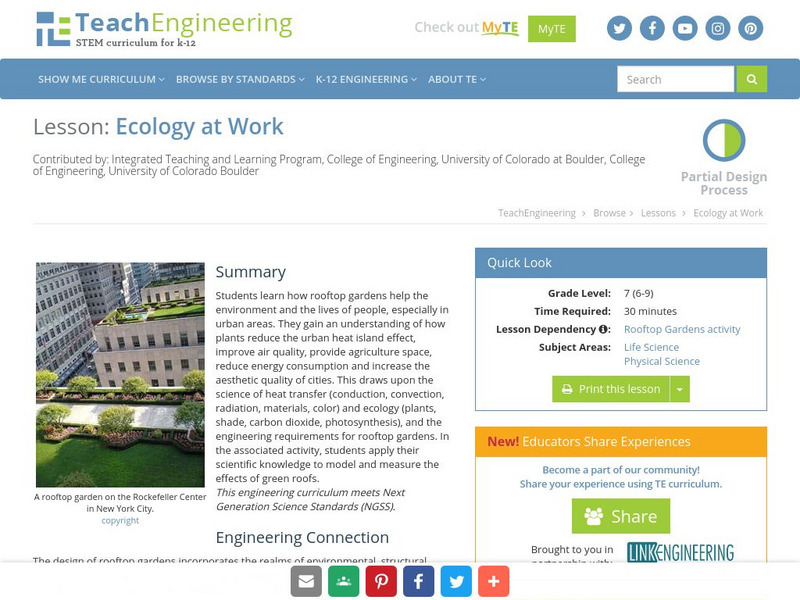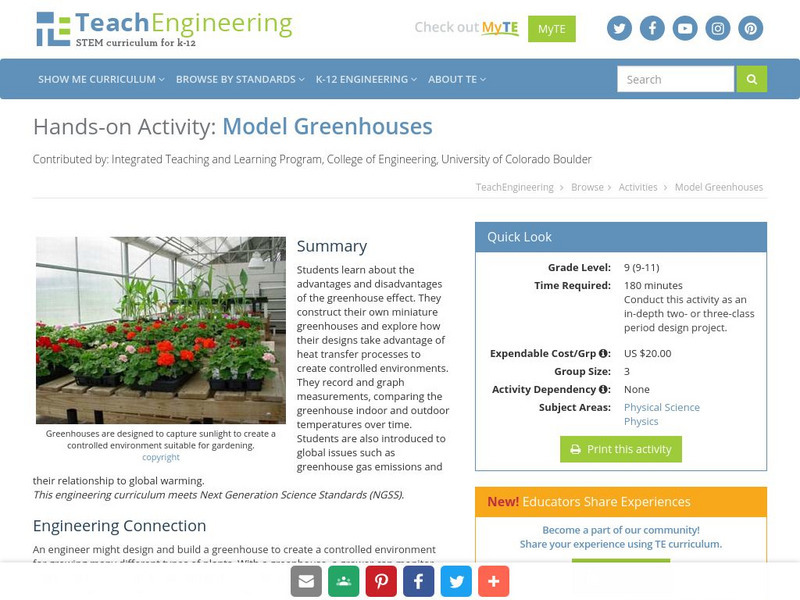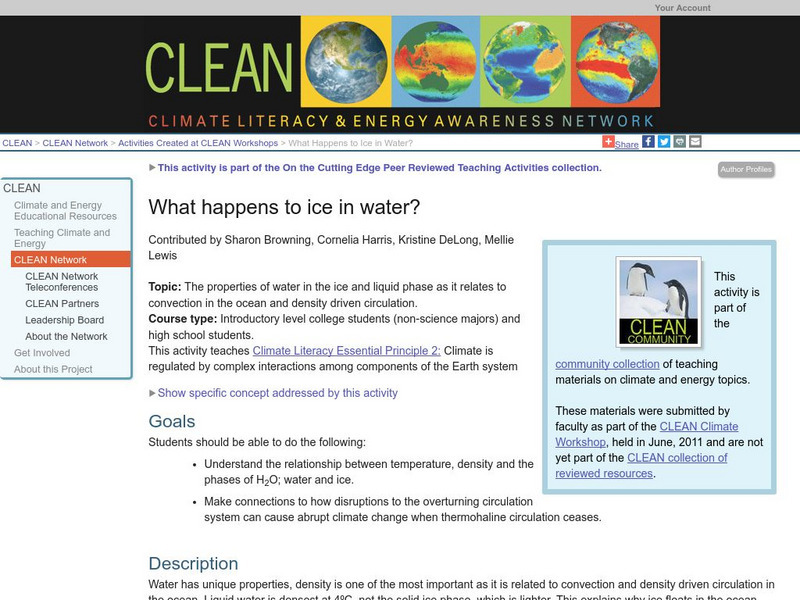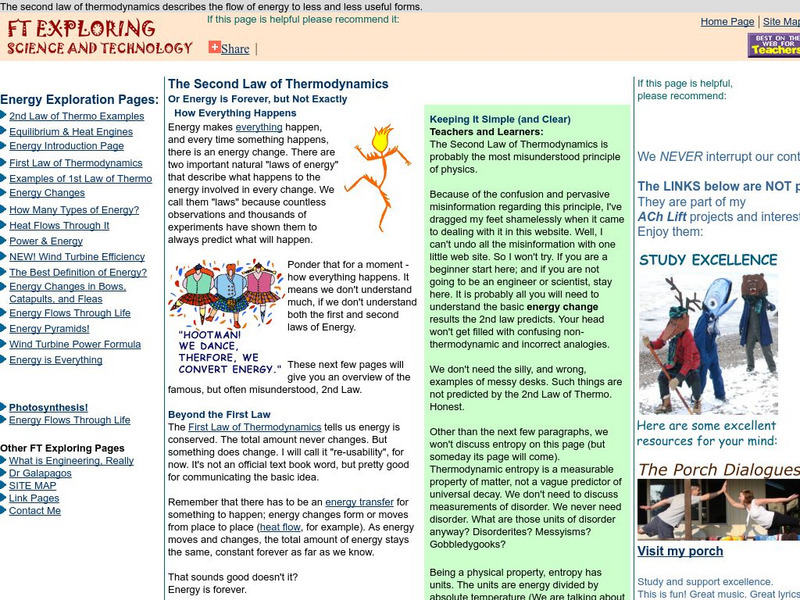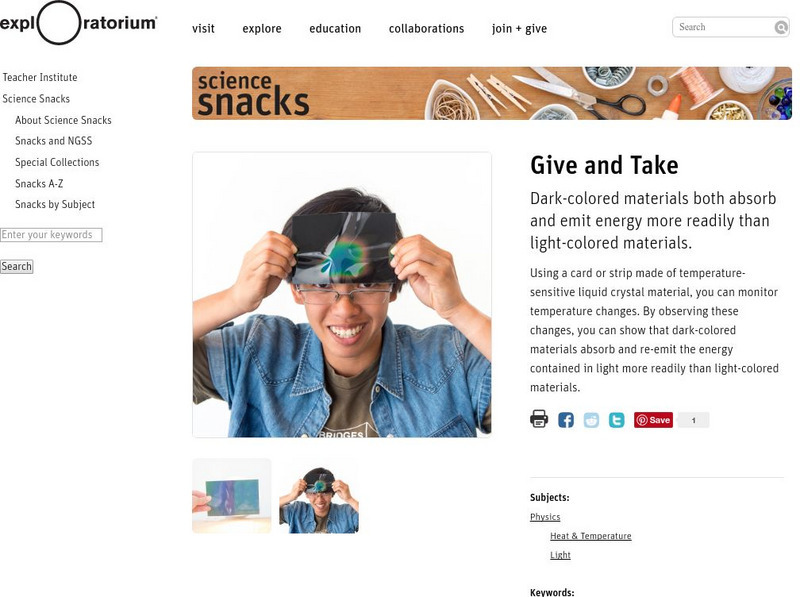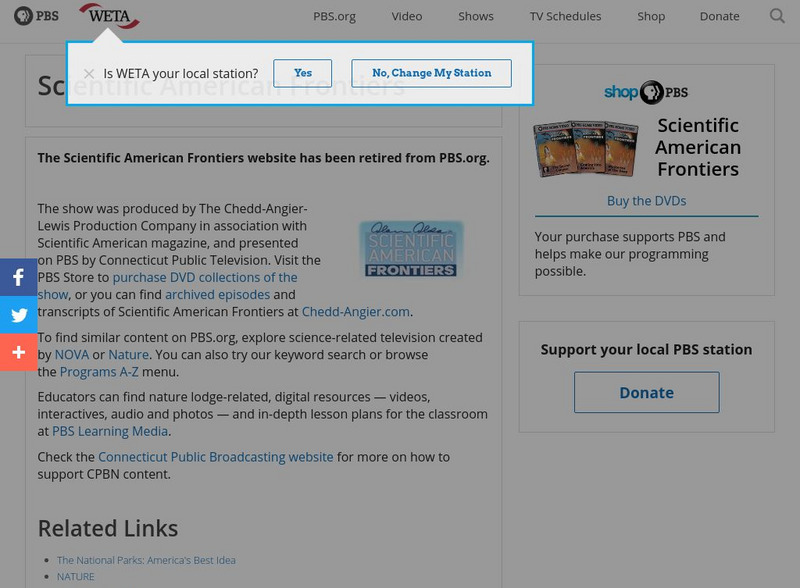Hi, what do you want to do?
Texas Education Agency
Texas Gateway: The First Law of Thermodynamics
By the end of this section, you will be able to define the first law of thermodynamics; describe how conservation of energy relates to the first law of thermodynamics; identify instances of the first law of thermodynamics working in...
TeachEngineering
Teach Engineering: Ecology at Work
Students learn how rooftop gardens help the environment and the lives of people, especially in urban areas. They gain an understanding of how plants reduce the urban heat island effect, improve air quality, provide agriculture space,...
Oklahoma Mesonet
University of Oklahoma: Overview of Meteorology
The University of Oklahoma explores numerous types of weather and atmospheric changes, as well as the reasons behind them. Content details the four seasons, common meteorological variables, the vertical structure of the atmosphere, how...
TeachEngineering
Teach Engineering: Model Greenhouses
Students learn about the advantages and disadvantages of the greenhouse effect. They construct their own miniature greenhouses and explore how their designs take advantage of heat transfer processes to create controlled environments....
Physics Classroom
The Physics Classroom: Thermal Physics
A two-lesson tutorial on thermal energy in the study of physics. Lessons include informational text, interactive activities, animations, and quick, interactive comprehension check-ins.
Other
Digital Library for Earth System Education: Teaching Box: Essentials of Weather
A suite of lessons focusing on the basic elements of climate and weather. Inquiry-based exploration of extreme weather events and the factors of weather including clouds, wind, air pressure, temperature, and the water cycle.
Science Buddies
Science Buddies: Which Is the Better Insulation Material?
You've probably noticed that the price of gasoline can fluctuate a great deal from one year to the next. Using good insulation material is one way to conserve energy and save money. Learn here which insulation materials work better than...
Climate Literacy
Clean: What Happens to Ice in Water?
Students investigate the properties of water in the ice and liquid phase as it relates to convection in the ocean and density driven circulation, and ultimately the climate.
McREL International
Mc Rel: Whelmer #42 Learning Activity: Fire Sandwich
An easy to do activity if you have a Bunsen burner. The activity investigates combustion and heat conductivity. The activity is in lesson plan format that meets NSES standards.
Curated OER
Fund. Of Phys. Geography/energy, Temperature, and Heat
A page describing (in part) the distinction between energy, temperature and heat. Includes graphic illustrating the quantity of energy needed to transform water between its various states. Methods of thermal energy transfer (convection,...
Georgia State University
Georgia State University: Hyper Physics: Thermal Conductivity
Lists thermal conductivity values for a variety of topics. The link "Heat conduction discussion" on this page displays an equation for calculating the rate of thermal conduction using these conductivity values.
Energy for Sustainable Development
Esd Bulgaria: Kids & Energy: Energy Pioneers: David Nelson Crosthwait
A profile of David Nelson Crosthwait (1898-1976), an African-American electrical and mechanical engineer. He was considered an authority on heat transfer, ventilation and air conditioning.
National Institute of Standards and Technology (NIST)
Thermophysical Properties of Fluid Systems
At this site, the student can find out thermophysical properties of different fluids and gases.
Science Education Resource Center at Carleton College
Serc: Why Is the Earth Still Hot Inside?
In this lesson, students conduct heat transfer experiments to investigate why the Earth is still hot at its core, even after billions of years since its formation. They will learn that the rate of heat transfer is dependent on an...
University Corporation for Atmospheric Research
Ucar: Introduction to the Atmosphere
A detailed overview of the Earth's atmosphere, with explanations about atmospheric properties, the structure of the atmosphere, its four layers, atmospheric processes, energy heat transfer, conduction and convection, and radiation. All...
FT Exploring
Ft Exploring: The Second Law of Thermodynamics
Learn about one of the most misunderstood principles of physics, the second law of thermodynamics.
Concord Consortium
Concord Consortium: What Makes Water Special?
Activity 2 investigates Why is water different from other liquids? This activity will discover the properties of different liquids. Students will explore what makes honey gooey and thicker than water. And why some liquids evaporate...
TOPS Learning Systems
Tops Learning Systems: Top Science: Conduction and Convection [Pdf]
Experiment investigating conduction and convection of heat in water.
Exploratorium
Exploratorium: Science Snacks: Pie Pan Convection
In this experiment, students observe what happens when a pan of soapy, colored water is heated. They will see that convection currents cause the fluid to rise and sink in a localized convection cell.
Other
Mansfield Connecticut: Convection, Conduction, and Radiation
Learn about Convection, Conduction and Radiation then play a game to assess what you learned.
TeachEngineering
Teach Engineering: How Hot Is It?
Learners learn about the nature of thermal energy, temperature and how materials store thermal energy. They discuss the difference between conduction, convection and radiation of thermal energy, and complete activities in which they...
Exploratorium
Exploratorium: Science Snacks: Give and Take
An activity for students to explore how dark-colored materials absorb and emit more energy vs. light-colored material.
Alabama Learning Exchange
Alex: Which Came First, Ice Cream or Refrigeration?
As learners begin their study of states of matter, this hands-on activity demonstrates how the interaction of a solid and a liquid can reverse the initial state of each material.This lesson plan was created as a result of the Girls...
PBS
Pbs Teachers: About All You Can Eat: Truth or Consequences
Demonstrate how calories are measured by building a calorimeter to measure the transfer of heat energy during a chemical or physical change. Test and record data on the calories in a peanut.






